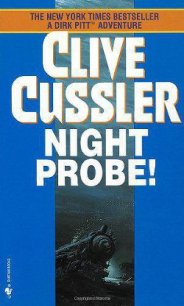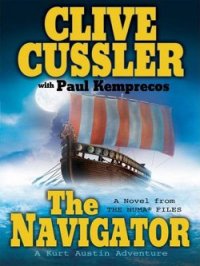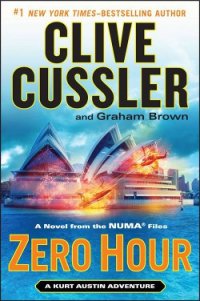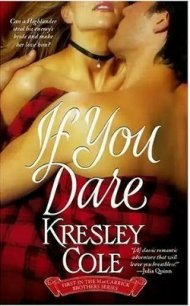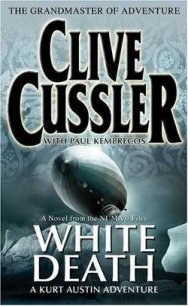Inca Gold - Cussler Clive (читаем полную версию книг бесплатно txt) 📗
The eyes below Zolar's surgically tightened lids glittered like gray crystal. The pinched, constantly flushed face complemented the thin, receding, brushed-back hair that was as dull red as Mexican saltillo tile. He was somewhere in his late fifties, with a face that was fathomless, a face that had rarely been out of an executive office or a boardroom, a face that was tempered by hard decisions and cold from issuing death warrants when he felt they were required. The body was small but hunched over like a vulture about to take wing. Dressed in a black silk jumpsuit, he wore the indifferent look of a Nazi concentration camp officer who considered death about as interesting as rain.
Zolar waited at the top of the stairs as his guest climbed toward the terrace. They greeted each other warmly and embraced. "Good to see you in one piece, Cyrus."
Sarason grinned. "You don't know how close you came to losing a brother."
"Come along, I've held lunch for you." Zolar led Sarason through the maze of potted plants to a lavishly set table beneath a palapa roof of palm fronds. "I've selected an excellent chardonnay and my chef has prepared a delicious braised pork loin."
"Someday I'm going to pirate him away from you," said Sarason.
"Fat chance." Zolar laughed. "I've spoiled him. He enjoys too many perks to jump ship."
"I envy your lifestyle."
"And I yours. You've never lost your spirit of adventure. Always skirting death and capture by police in some desert or jungle when you could conduct business out of a luxurious corporate office and delegate the dirty work to others."
"A nine-to-five existence was never in my blood," said Sarason. "I find wallowing in dirty dealings an exciting challenge. You should join me sometime."
"No, thank you. I prefer the comforts of civilization."
Sarason noticed a table with what looked like four weathered tree limbs about one meter in length lying across its surface. Intrigued, he walked over and studied them more closely. He recognized them as sun-bleached roots of cottonwood trees that had grown naturally into grotesque human-shaped figures, complete with torsos, arms and legs, and rounded heads. Faces were crudely carved in the heads and painted with childlike features. "New acquisitions?" he asked.
"Very rare religious ceremonial idols belonging to an obscure tribe of Indians," answered Zolar.
"How did you come by them?"
"A pair of illegal artifact hunters found them in an ancient stone dwelling they discovered under the overhang of a cliff."
"Are they authentic?"
"Yes, indeed." Zolar took one of the idols and stood it on its feet. "To the Montolos, who live in the Sonoran Desert near the Colorado River, the idols represent the gods of the sun, moon, earth, and life-giving water. They were carved centuries ago and used in special ceremonies to mark the transition of boys and girls into young adulthood. The rite is full of mysticism and staged every two years. These idols are the very core of the Montolo religion."
"What do you estimate they're worth?"
"Possibly two hundred thousand dollars to the right collector."
"That much?"
Zolar nodded. "Providing the buyer doesn't know about the curse that stalks those who possess them."
Sarason laughed. "There is always a curse."
Zolar shrugged. "Who can say? I do have it on good authority that the two thieves have suffered a run of bad luck. One was killed in an auto accident and the other has contracted some sort of incurable disease."
"And you believe that hokum?"
"I only believe in the finer things of life," said Zolar, taking his brother by the arm. "Come along. Lunch awaits."
After the wine was poured by a serving lady, they clinked glasses and Zolar nodded at Sarason. "So, brother, tell me about Peru."
It always amused Sarason that their father had insisted on his sons and daughters adopting and legalizing different surnames. As the oldest, only Zolar bore the family name. The far-flung international trade empire that the senior Zolar had amassed before he died was divided equally between his five sons and two daughters. Each had become a corporate executive officer of either an art and antique gallery, an auction house, or an import/export firm. The family's seemingly separate operations were in reality one entity, a jointly owned conglomerate secretly known as the Solpemachaco. Unknown and unregistered with any international government financial agencies or stock markets, its managing director was Joseph Zolar in his role as family elder.
"Nothing short of a miracle that I was able to save most of the artifacts and successfully smuggle them out of the country after the blunders committed by our ignorant rabble. Not to mention the intrusion by members of our own government."
"U.S. Customs or drug agents?" asked Zolar.
"Neither. Two engineers from the National Underwater and Marine Agency. They showed up out of nowhere when Juan Chaco sent out a distress call after Dr. Kelsey and her photographer became trapped in the sacred well."
"How did they cause problems?"
Sarason related the entire story from the murder of the true Dr. Miller by Amaru to the escape of Pitt and the others from the Valley of the Viracocha to the death of Juan Chaco. He finished by giving a rough tally of the artifacts he had salvaged from the valley, and how he arranged to have the cache transported to Callao, then smuggled out of Peru in a secret cargo compartment inside an oil tanker owned by a subsidiary of Zolar International. It was one of two such ships used for the express purpose of slipping looted and stolen art in and out of foreign countries while transporting small shipments of crude oil.
Zolar stared into the desert without seeing it. "The Aztec Star. She is scheduled to reach San Francisco in four days."
"That puts her in brother Charles's sphere of activity."
"Yes, Charles has arranged for your shipment to be transported to our distribution center in Galveston where he will see to the restoration of the artifacts." Zolar held his glass up to be refilled. "How is the wine?"
"A classic," answered Sarason, "but a bit dry for my taste."
"Perhaps you'd prefer a sauvignon blanc from Touraine. It has a pleasing fruitiness with a scent of herbs."
"I never acquired your taste for fine wines, brother. I'll settle for a beer."
Zolar did not have to instruct his serving lady. She quietly left them and returned in minutes with an iced glass and a bottle of Coors beer.
"A pity about Chaco," said Zolar. "He was a loyal associate."
"I had no choice. He was running scared after the fiasco in the Valley of Viracocha and made subtle threats to unveil the Solpemachaco. It would not have been wise to allow him to fall into the hands of the Peruvian Investigative Police."
"I trust your decisions, as I always have. But there is still Tupac Amaru. What is his situation?"
"He should have died," replied Sarason. "Yet when I returned to the temple after the attack of our gun-happy mercenaries, I found him buried under a pile of rubble and still breathing. As soon as the artifacts were cleared out and loaded aboard three additional military helicopters, whose flight crews I was forced to buy off at a premium, I paid the local huaqueros to carry him to their village for care. He should be back on his feet in a few days."
